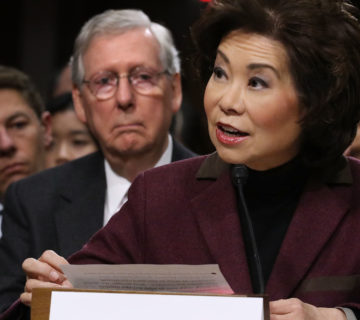WASHINGTON – Today, Restore Public Trust Director Lizzy Price released the following statement in advance of tomorrow’s Senate Health Committee hearing on the nomination of Dr. Stephen Hahn to serve as commissioner of the Food and Drug Administration (FDA). The hearing comes on the heels of news that the Trump administration is caving to special interest groups and putting their own political interests ahead of public health by retreating on its proposed ban of flavored e-cigarettes.
“As the Trump administration once again puts special interest profits and its own political interests ahead of the health and safety of people across the country, FDA commissioner nominee Stephen Hahn must commit in this hearing to stand up to the pharmaceutical industry lobbyists and fight for policies that would actually reduce the cost of prescription drugs. If he won’t, then patients and families across the country should demand that their Senators vote against his nomination and fight for an FDA head who will put their health and interests ahead of drug companies’ profits.”
On October 28th, Restore Public Trust released the following three questions that Hahn must address before being confirmed.
Question 1: Are you willing to support referential pricing as a means to reduce the astronomical cost of prescription drugs in this country?
The Trump administration has still failed to lower the sky-high cost of prescription drugs. As FDA director, Hahn would report to HHS Secretary Alex Azar, a former top executive at the pharmaceutical giant Eli Lilly, which hiked the drug prices astronomically while Azar was an executive. Would Hahn hold firm to his previous support for reference pricing, which has been called the drug industry’s “biggest nightmare,” in order to help sick Americans afford the medications they need? Or would he continue Azar and Trump’s pattern of giving in to Big Pharma’s financial interests?
Question 2: This past spring, your employer MD Anderson came under fire for dismissing ethnically Chinese researchers over academic espionage concerns. Can you explain what happened?
As Stat reported earlier this year, Hahn received blowback for his company’s decision to oust three ethnically Chinese sciences over concerns of academic espionage after some employees saw the move as “racially motivated.” As FDA head, it is crucial for Hahn to ensure that the decisions he makes are not based in bias or bigotry, and are solely in the best interest of the American public. Is Hahn prepared to make that promise to the Americans he’s been nominated to serve?
Question 3: In 2012, your employer MD Anderson was the recipient of a controversial cancer-drug development grant that had not undergone any scientific peer review and caused large scandal in the medical community. Given this history, how can you assure that you would be able to prevent something similar from happening on a larger scale?
After Hahn’s employer, MD Anderson, was awarded $18 million to develop new cancer drugs by the Cancer Prevention And Research Institute of Texas (CPRIT), the institute’s chief scientific officer and several reviewers resigned over concerns that the grant never went through scientific review and that it “dishonored” the peer review system. A scandal like this at the FDA would have the power to decimate Americans’ crucial trust in the nation’s drug safety watchdog, with potentially grave consequences. Can Hahn ensure that he will safeguard the FDA from a situation similar to that of his former employer?
See full questions and backup here.
###



